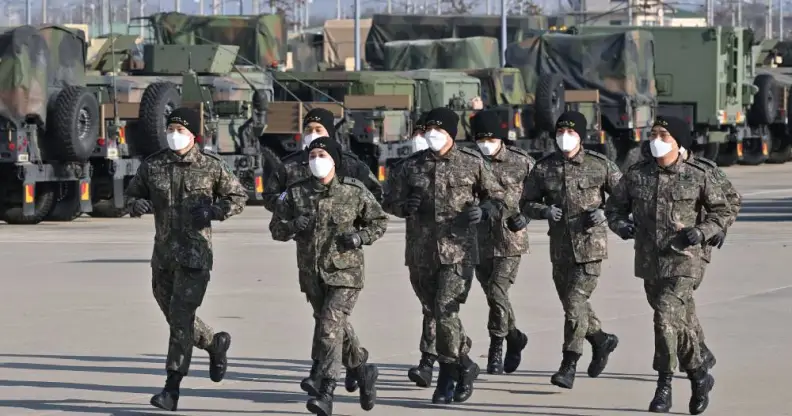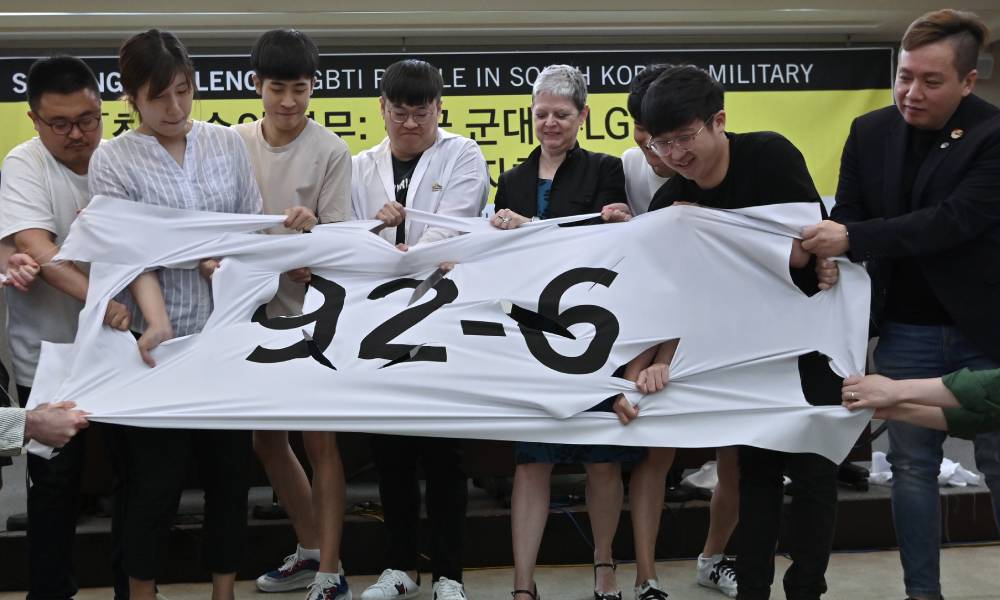South Korea’s top court overturns convictions of gay soldiers in landmark ruling

South Korea’s supreme court has overturned a previous military court order convicting two soldiers for a consensual same-sex relationship. (Jung Yeon-je/AFP via Getty)
South Korea’s supreme court has overturned the conviction of two soldiers who were in a same-sex relationship while off their military base.
The two defendants – a first lieutenant and a master sergeant – were brought up on charges of breaking the military’s decades-old ban on same-sex conduct after they were found to have had sex in a private house while off-duty in 2016, the New York Times reported.
The lieutenant was sentenced to four months in jail, and the sergeant was given a three-month sentence by lower military courts. Both sentences were suspended, and the men appealed the decision to the supreme court.
In its ruling on Thursday (21 April), the supreme court concluded that the military provision should not apply to consensual same-sex relations between service members away from a military setting.
Chief justice Kim Myeong-su said the court’s full 13 justice panel ruled that the “specific ideas of what constitutes as indecency has changed accordingly with the changes in time and society”, the Associated Press reported.
“The view that sexual activity between people of the same sex is a source of sexual humiliation and disgust for objective regular people and goes against decent moral sense can hardly be accepted as a universal and proper moral standard for our times,” Kim said.
The court later said that the decision was meaningful as it was a “declaration” that “consensual same-sex sexual activity (among military service members) could no longer been considered as punishable in itself”.
South Korea’s defence ministry said it will “carefully examine” the supreme court’s ruling and proceed with the case, which was sent back to the military court.
Anyone found guilty of breaking article 92-6 of South Korea’s 1962 Military Criminal Act faces a maximum prison sentence of two years for “anal intercourse” and “any other indecent acts” between same-sex service members in the country’s predominantly male military.
In South Korea, men between the ages of 18 and 28 are required to serve at least 18 months of military service.
In 2017, at least 32 service members were charged for violating the act in a particularly aggressive crackdown on same-sex relations in the military, according to the New York Times.
The two defendants were among at least nine soldiers indicted under the military law, and rights groups have long condemned the law for permitting a “witch hunt” against gay soldiers in South Korea.
The Center for Military Human Rights Korea welcomed the ruling and said it will “serve as a milestone in the long debate over this law”, Reuters reported.
Amnesty International’s East Asia researcher Boram Jang called on the South Korean government to “swiftly repeal” article 92-6 as the “next step towards ending the pervasive stigmatisation” faced by LGBT+ people in the country.
“This groundbreaking decision is an important triumph in the fight against discrimination faced by LGBTI people in South Korea,” Jang said.
“The criminalisation of consensual same-sex sexual acts in South Korea’s military has long been a shocking violation of human rights, but today’s ruling should pave the way for military personnel to freely live their lives without the threat of prosecution.”

South Korean activists tear a banner calling for repeal of article 92-6 of the Military Criminal Act during a press conference. (Jung Yeon-je/AFP via Getty)
While homosexuality is no long criminalised in the country, South Korea remains slow to adopt broader protections for the LGBT+ community. There are little to no discrimination protections nor recognition of same-sex relationships, adoption rights and no ban on conversion therapy.
The death of South Korea’s first trans soldier last year became a focal point on how LGBT+ service members are treated in the country.
Byun Hee-soo was discharged from the army in 2020 after undergoing gender-affirmation surgery, and she launched a landmark legal battle to overturn the military’s decision, which was dismissed.
Byun then filed an administrative suit, alleging that her dismissal was unconstitutional. Sadly, she died before ever getting justice, but her family promised to keep her fight going.
In October, she was given a posthumous victory after the Daejeon District Court ordered the cancellation of her forceful discharge. The court ruled that the army’s decision to discharge Byun was “undoubtedly illegal and should be cancelled” as it was based on the incorrect assumption she was male.

